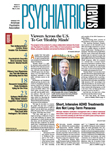I knew for over a year that I was going to become the president of APA at 5 p.m. on a given Thursday in May 2008, but I was surprised by the impact of that moment. Probably finishing my term at 5 p.m. on a Thursday in May this year will be just as powerful. There are many things the APA president can't do: make APA policy, ensure that media statements about psychiatry are positive and accurate, please all the members of APA. The Board of Trustees has the legal responsibility for APA. The medical director/chief executive officer hires and administers the staff to carry out those decisions.
But the president of APA sets the agenda for the Board. The president should ensure that Board members have the information and discussion they need to make good decisions. The APA president receives and responds to hundreds of comments, requests, complaints, and suggestions from APA members and from outside friends and enemies of APA. The president speaks for APA with other organizations, with the media, and at hearings of Congress, the FDA, and other arms of government. As an APA member, I had been candid about my opinions. As the president of APA, I am not entitled to express personal opinions; I am bound by APA policy, and my statements are APA statements. There are also urgent situations that require carefully crafted strategy in the absence of specific APA policy. The attitudes and statements of the APA president carry weight with the APA staff, the membership, and the outside world. The president needs to make the right decisions and the right statements, promptly, for 365 days.
The APA president is received with great respect by colleagues all over the world. I have enjoyed representing you at the meetings of the Royal College of Psychiatrists in London; the Indian Psychiatric Association in Agra; and the World Psychiatric Association in Paris, Shanghai, Prague, and Florence and meeting you at local, state, and regional APA meetings from Seattle to New York and Texas to Minnesota.
I came into my presidential year determined to address our relationships with the pharmaceutical industry, reorganize our large and complex governance structure, increase efforts to serve the underserved, carry on our tradition of leadership on the social issues that impact mental health, highlight preventive psychiatry, strengthen our relationships with mental health advocacy groups and mental health and medical professionals, and not to be intimidated by our enemies. I wanted to use every opportunity to impress upon our government and the public the validity of our diagnoses and the effectiveness of our treatments. I wanted to make our members from every ethnic group, from every medical school, and from every subspecialty know how much we respect their contributions. I wanted APA to participate in health care reform and to prepare us for the psychiatry of five and 10 years from now. With the support of the members and our excellent staff, I was able to get many of these efforts in motion and complete some of them.
There were unexpected demands. Despite our leadership in addressing conflicts of interest and our careful preparations for the development of DSM-V, we suffered attacks on both in the past year. We responded with facts. We sent a 50-page report to Sen. Charles Grassley (R-Iowa) and the New York Times. I believe we are the first specialty society to put up a Web site offering our members and the public detailed information about the development of our diagnostic system and requesting feedback. Our decision to discontinue industry-supported symposia and meals at our meetings was reported in all the major media and was overwhelmingly well received by members, as was our decision to right-size our governance. Public opinion about psychiatry and psychiatrists is increasingly more informed and more positive.
I have been on call 24/7 for 365 days. It will be a relief not to feel responsible for APA, but it will also be a loss. I have loved traveling the country and the world for APA, and I have felt proud to defend our field and our Association. I have cherished the opportunity to listen and speak to you. It has been an extraordinary privilege to represent the members of APA, who have dedicated their knowledge, compassion, and wisdom to the relief of human suffering. Thank you. ▪

